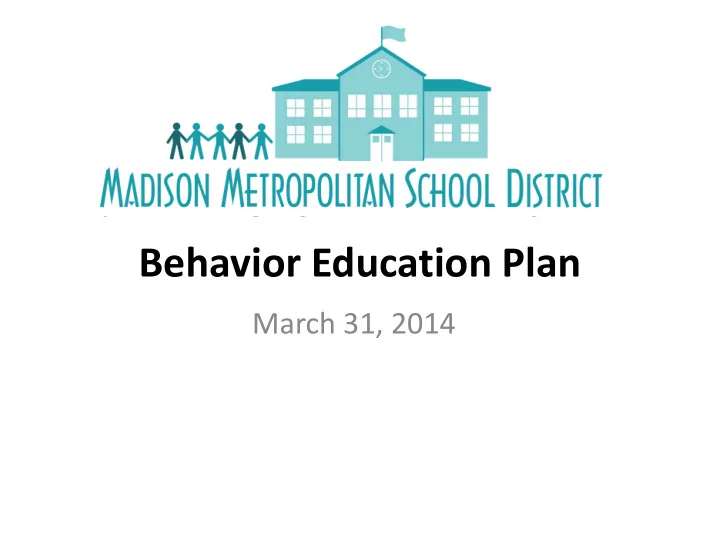

Behavior Education Plan March 31, 2014
Supported by Research • National research shows that exclusionary practices are ineffective in changing student behavior. • Research also shows: - Suspension and expulsion predict higher rates of future misbehavior - School removals are associated with a higher likelihood of school dropout - Suspension and expulsion increase the likelihood that the child or youth will enter the criminal justice system
L ost Instr uc tion Days of Instruction Lost - Out-of-School Suspensions 7064 6640 6327 6278 6075 1117 983 1174 1143 461 958 604 808 582 513 722 844 686 4548 4467 4421 4074 3618 2008-09 2009-10 2010-11 2011-12 2012-13 Asian African American Hispanic Two or more races White In 2013-13, students lost more than 6,000 days of instruction due to suspensions.
Dispr opor tionality MMSD Demographics Spring 2013 Out-of-School Suspensions 2012-13 8% 13% 19% 15% 1% 19% 60% 45% 11% 9% African American Hispanic Asian White Two or more races African American Hispanic Asian White Two or more races Large disparities exist between MMSD demographics and shares of suspensions 15% 51% 52% 52% 72% 76% 84% 91% 85% 49% 48% 48% 28% 24% 16% 9% Percent of Percent of Percent of Percent of Percent of Percent of Percent of Percent of MMSD Suspensions MMSD Suspensions MMSD Suspensions MMSD Suspensions Not low-income Not ELL Not Special Education Male Low-income ELL Special Education Female
Our current state requires a shift in our thinking and our day-to- day practices.
Developing the Behavior Education Plan • Board started the process and created the ad hoc committee on September 16 • Series of eight focus groups • Survey to all MMSD families • Input from principals, teachers, families, students, community leaders collected • Guidance from national expert and other urban districts
Guiding Principles • We are grounded in a strong focus on engagement and learning. • Whenever possible, we avoid exclusionary practices. • We believe in teaching and intervention over consequences and punishment. • We support progressive discipline, not zero tolerance.
Guiding Principles • We believe that strong school-family partnerships are important. • We will use disaggregated data to identify disparities, monitor progress and drive decisions. • We believe that every child, when provided with appropriate support, can learn and succeed. • We support proactive problem-solving on behalf of students.
Overview of Behavior Education Plan • Teaching and learning model rather than rules and consequences model - Plan outlines interventions rather than only disciplinary consequences - Discipline must be paired with interventions • Progressive discipline - Always start at the lowest level and increase interventions as necessary
Overview of Behavior Education Plan • Decrease exclusionary practices - Suspension no longer allowed for response levels one and two - Use of school suspension dramatically decreased – by 20 violations in elementary, 10 in secondary - Elimination of aggravating factors - Increased use of restorative practices
Overview of Behavior Education Plan • Parents included as partners at problem- solving table • Plan requires staff to contact parents immediately if a suspension occurs, within 24 hours if there is no suspension • Plan requires regular data analysis and problem-solving by school teams and central office
Implementation • Integrating BEP into School Improvement Plans - Goals and measures around behavior in climate and culture section • BEP toolkit • Focus on professional development • Regular data monitoring, adjustments as needed • BEP coordinator to work with schools
Intensive Support Like in our school support system, some schools will require intensive support in implementation: • Funding or seats at professional development on classroom management • Additional PBS support through increased internal coach or consultation with external coach • Additional psychologist, social worker to provide tier two or three interventions • Additional support for restorative practices Through school improvement planning process, SBLTs and principals work to identify what would best support implementation in their school.
Questions
Recommend
More recommend